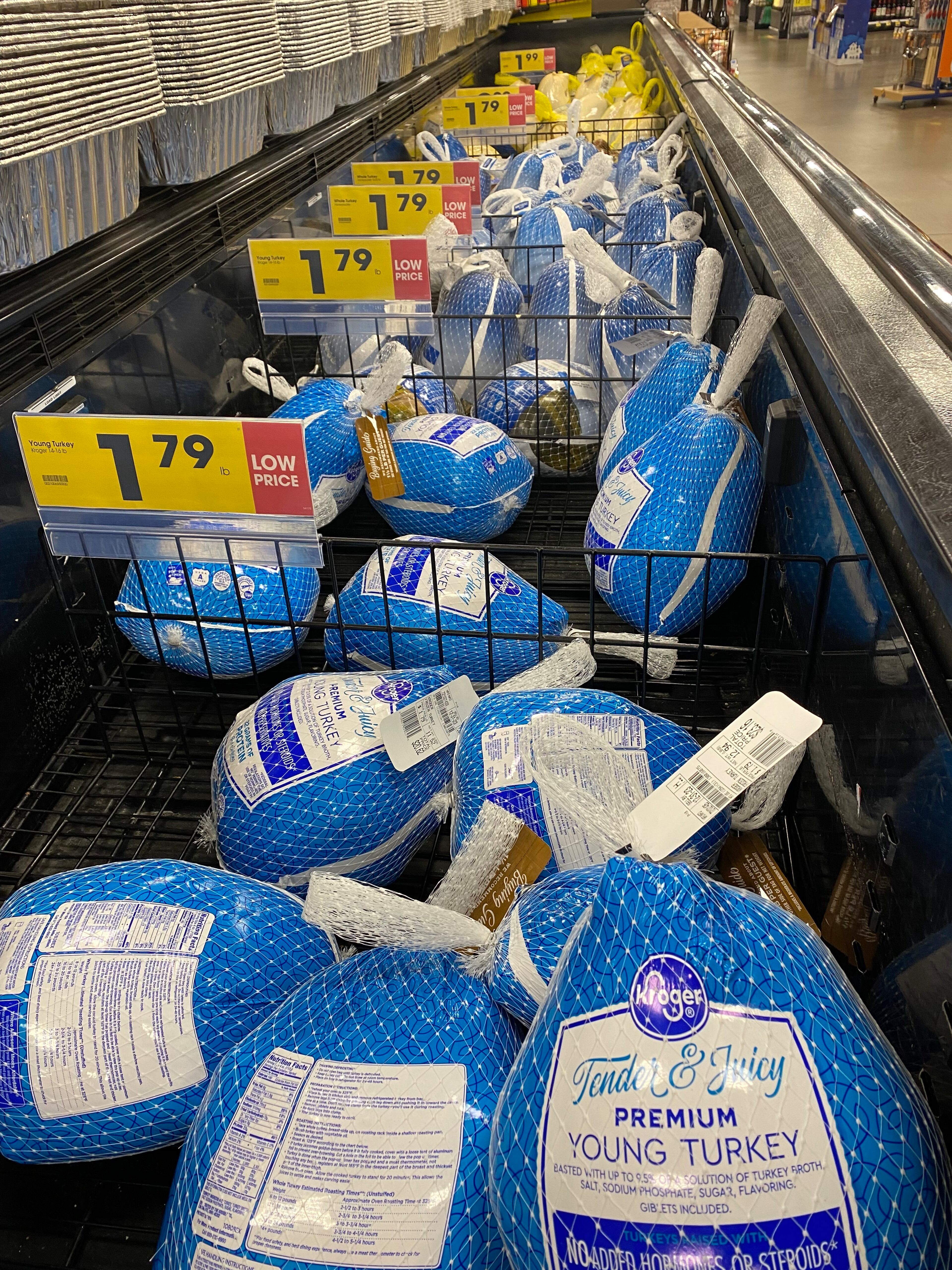Turkey prices won’t gobble up Georgians’ Thanksgiving budget this year

With Thanksgiving less than three weeks away, national headlines have warned consumers that turkeys will cost more this year and may be harder to come by.
The higher prices and smaller birds are attributed to inflation, supply chain disruptions, and bird flu that has affected 49 million birds — including more than 7 million turkeys — in the U.S. since January. Risk of exposure to the highly contagious virus prompted some poultry producers to process their holiday birds earlier than normal.
According to the latest U.S. Department of Agriculture weekly report, the average price nationally per pound for a frozen hen was $1.47 and $1.30 for a frozen tom. That is up from $1.15 and $1.13, a roughly 25% increase from 2021 prices, a faster increase than overall inflation.
Typically, hens weigh 10 to 14 pounds. Toms weigh 16 to 20 pounds.
Despite bleak indications nationwide, Georgians who look forward to turkey as the centerpiece of their Thanksgiving meal needn’t be alarmed.
“There is no doom or gloom at metro area Kroger stores regarding the supply of Thanksgiving turkeys,” said Tammie Young-Ennaemba, corporate affairs manager for Kroger, which has 167 grocery stores across 75 cities in Georgia. “Frozen turkeys are already in our cases and fresh turkeys will be available about two weeks prior to Thanksgiving.”
“Our supply chain team started working earlier in the year to ensure there is no shortage of Thanksgiving turkeys in the Atlanta division,” Young-Ennaemba said.
According to Young-Ennaemba, Kroger customers can expect to pay 10 to 20 cents per pound more for a whole turkey this year compared to last year. “Due to our team’s early action, we have been able to reduce the impact of inflation,” she said.
On Friday, Kroger-branded whole frozen hens and toms were readily available and marked at $1.79 per pound at a store at 3871 Peachtree Road in Brookhaven. At a nearby Publix, similar products were running $1.99 per pound.
Even local butcher shops took early steps to secure turkeys for the biggest food holiday of the year.
“We had to preorder two months earlier than normal,” said Rusty Bowers of Pine Street Market in Avondale Estates and Chop Shop in Atlanta’s Edgewood neighborhood. He placed his order for heritage breed turkeys raised by Joyce Farms in North Carolina at the end of August. “Normally, it would be beginning of October,” Bowers said.

As for the cost of fresh whole turkeys and turkey breasts, “It’s going to be more (than last year), but not scary. We don’t want our prices to be foul,” Bowers punned.
A 10-cent-per-pound increase over 2021 prices is what customers can expect at Kinship butcher shop in Virginia-Highland, which is also taking preorders for Joyce Farms products. Although the availability for large birds is low, the shop is also selling 10- to 12-pound birds and half turkeys. The retail cost is $7.99 per pound, with a $50 nonrefundable deposit. Orders are available for pickup between Nov. 19-23.
In February, the Georgia Department of Agriculture took steps to protect the poultry industry, the state’s most lucrative farming sector, after a deadly strain of bird flu was found on a commercial turkey farm in Indiana, a chicken operation in Kentucky and in a backyard flock in Virginia. The department suspended the sale of live chickens at trade shows, flea markets and other outlets. It also called on growers to implement biosecurity practices to protect their flocks, such as keeping birds inside, limiting their exposure to outdoor water sources and maintaining sanitation.
While Georgia is one of the 44 states where highly pathogenic avian influenza (HPAI) A(H5) viruses have been detected, only two outbreaks have been reported, and neither was a commercial poultry flock, according to data from the Centers for Disease Control and Prevention.
Shaun Terry of Grateful Pastures, a small poultry farm in Madison, raised 300 turkeys this year. By late October, he had sold between 30 and 40 of them. “When I first bought the turkeys, everything I heard was, ‘Grow as many as you can. You’ll sell out.’ I don’t know what to expect,” said Terry.
Grateful Pastures fresh turkeys range from 7.5 to 22 pounds and are sold on its website for $10 per pound (with pickup at area farmers markets). The price reflects the added cost of running a USDA certified-organic poultry operation, the only one in Georgia, but Terry also noted that his cost for chicken and turkey feed increased 25% this year. “Supply chain issues all over the globe and grain issues caused by the war in Ukraine — a massive grain producer — it affects the whole market.”
Whether Atlantans want to nab a turkey now or hit up the grocery aisle during the Thanksgiving rush, there should be more than enough birds to go around — and without hurting the pocketbook.
Sign up for the AJC Food and Dining Newsletter
Read more stories like this by liking Atlanta Restaurant Scene on Facebook, following @ATLDiningNews on Twitter and @ajcdining on Instagram.



